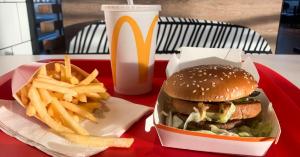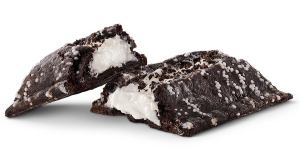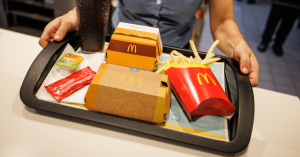Following a recent round of tests, McDonald’s new touchscreen menus were found to have fecal matter on them.
Metro reports that Dr. Paul Matewele — senior lecturer in microbiology at London Metropolitan University — revealed how the study discovered every screen they had inspected had tested positive for feces.
Videos by PopCulture.com
“We were all surprised how much gut and faecal bacteria there was on the touchscreen machines. These cause the kind of infections that people pick up in hospitals,” he explained. “For instance Enterococcus faecalis is part of the flora of gastrointestinal tracts of healthy humans and other mammals. It is notorious in hospitals for causing hospital acquired infections.”
The concern that has arisen with this study, is that many people may be touching the screen — which would potentially transfer the bacteria to their hands — and then touching their food as it enters their mouths to eat.
Over the course of the testing, the study team found that one of the touchscreens tested positive for staphylococcus, “a bacteria that can cause blood poisoning and toxic shock syndrome.”
“Seeing Staphylococcus on these machines is worrying because it is so contagious,” Dr. Matewele explained. “It starts around people’s noses, if they touch their nose with their fingers and then transfer it to the touchscreen someone else will get it, and if they have an open cut which it gets into, then it can be dangerous.”
“There is a lot of worries at the moment that staphylococcus is becoming resistant to antibiotics,” he added. “However, it is still really dangerous in places like Africa where it can cause toxic shock.”
Dr. Matewele also revealed that the study found Listeria, Proteus, and Klebsiella on the screens as well.
“Listeria is another rare bacterium we were shocked to find on touchscreen machines as again this can be very contagious and a problem for those with a weak immune system,” he stated.
“Proteus can be found in human and animal [feces]. It is also widely distributed in soil. It can cause urinary tract infections and is also one of the hospital acquired infections where it may responsible for septicaemia,” Dr. Matewele continued. “Klebsiella is also from the gut and mouth, they are associated with urinary tract infections, septicemia and diarrhoea. Some species can infect the respiratory tract resulting in pneumonia.”
“Touchscreen technology is being used more and more in our daily lives but these results show people should not eat food straight after touching them, they are unhygienic and can spread disease,” he also stated. “Someone can be very careful about their own hygiene throughout the day but it could all be undone by using a touchscreen machine once.”
Regarding the study, a spokesperson for McDonald’s stated, “Our self-order screens are cleaned frequently throughout the day. All of our restaurants also provide facilities for customers to wash their hands before eating.”





